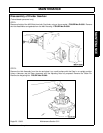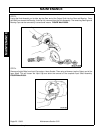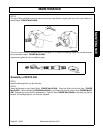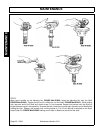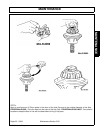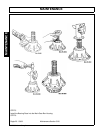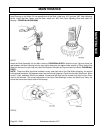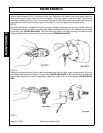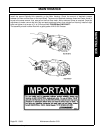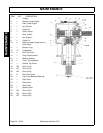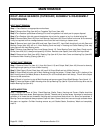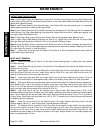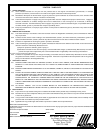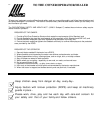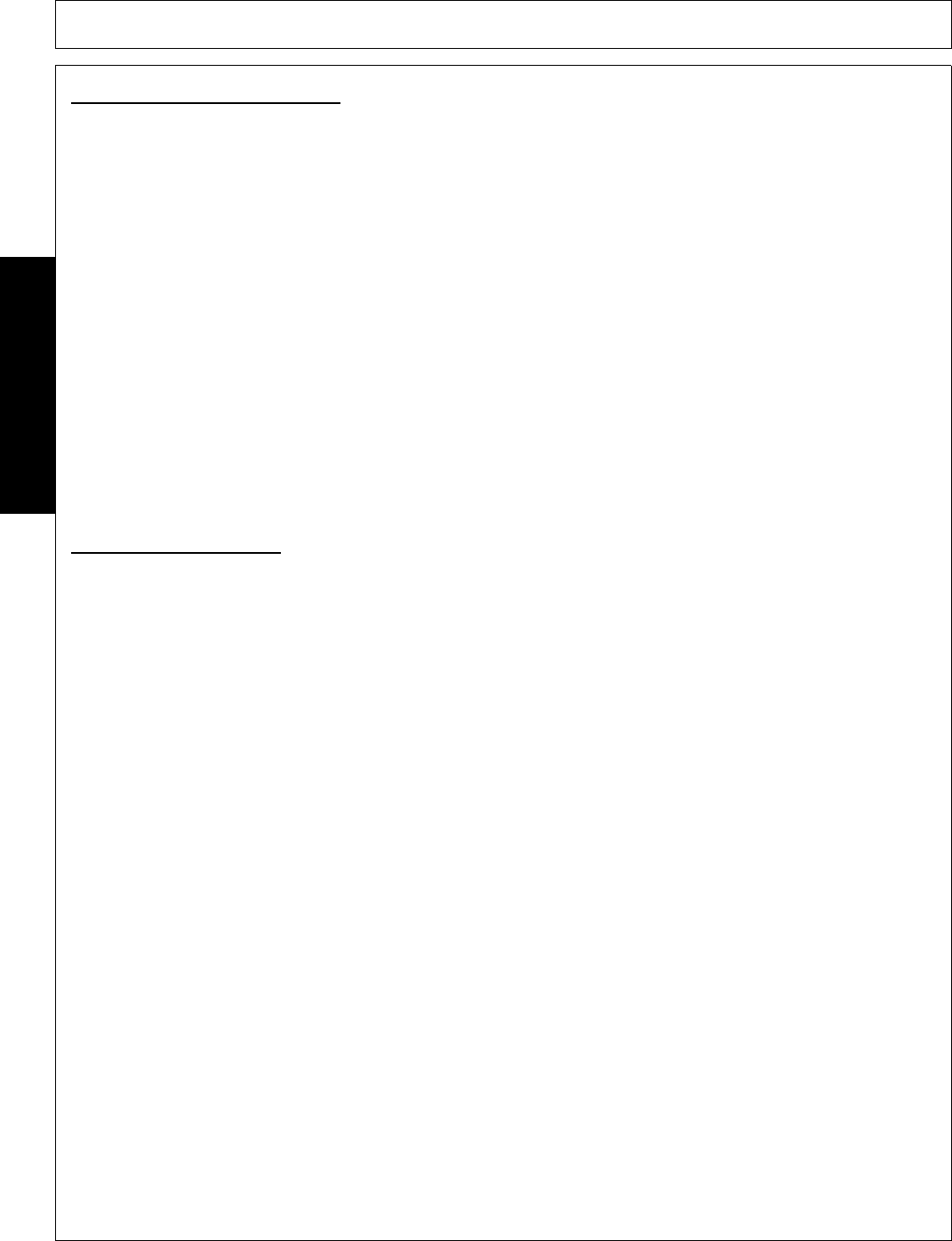
MAINTENANCE
Eagle 20 03/09 Maintenance Section 5-32
© 2009 Alamo Group Inc.
MAINTENANCE
OUTPUT SHAFT INSTALLATION
Step 1. Install Upper Output Shaft Bearing Cup (item # 12) into Main Housing from the top, Install Output Shaft
Lower Bearing Cup (item # 2) into Main Housing (item # 1) from the bottom, Make sure both Bearing Cup are
seated firmly against housing.
Step 2. Install Lower Bearing Cone (item #2) down over Output Shaft from top making sure it is completely
seated against shoulder on lower part of Output Shaft.
Step 3. Insert Output Shaft (item # 8) into Main Housing from the bottom till Lower Bearing Cone is seated into
Lower Bearing Cup, Slide Upper Bearing Cone down over Output Shaft from the till it seats down against and
into upper output Shaft Bearing Cup.
Step 4. Slide Output Gear (item # 9) down over Output Shaft till it sits against upper Bearing Cone.
Step 5. Install Output Shaft Bearing Adjusting nut (item # 10) Tighten Nut to set Pre-Load on Output Shaft
Bearings. Bearing Preload should be from 12 to 14 inch pounds of Rolling Torque.
Step 6. Using Soft Metal (Brass or Aluminum) Pin Strike both ends of Shaft with a hammer and recheck the
Bearing Pre-Load, This is to ensure Bearings and components are centered and seated. If Bearing Pre-Load is
OK insert Cotter Pin (item # 11) and Bend ends.
Step 7. Output Seal, Put a light coat of Grease on ID of Seal or on OD of shaft where Seal rides. Install the
Output Seal using a Seal Driver.
INPUT SHAFT REMOVAL
Step 1. Install Inner Bearing Cup (item # 12) into back of main Housing (item # 1), Make sure Cup is seated
into Main Housing.
Step 2. Install Outer Bearing Cup (item # 12) into back of Front Bearing Cover (item # 24). Make sure Cup is
Seated into front Cover.
Step 3. Install Spacer (item # 13) onto Back side of Input Shaft (item # 26), Install Spacer (item # 28) onto
input Shaft (item # 26) from the front. Install Shims (item # 29,30 & 31) onto input Shaft from the front. For
quantity of Shims refer to how many were removed.
Step 4. Install Input Gear (item #27) on to Input Shaft From, Install Outer Bearing Cone (item # 12) on to
input shaft and slide down till it seats against Gear. Install Inner Bearing Cone (item # 12) Onto input shaft.
Step 5. Slide Input Shaft with all components down into Main Housing till Inner Bearing Cone is seated into
Inner Bearing Cup. Look at Input Gear and Output at this time, Input Gear should not be held up by Outer
Gear, if it is it will be required to add Shims (item # 29,30 & 31). If Input Gear and Output Gear Seem to far
away from each other remove some Shims (item # 29,30 & 31).
Step 6. Input Seal (item # 25) can be installed now or wait till later. With Shims (item # 20,21 & 22)
lowerInput Bearing Cap (item # 24) down over Input Shaft. Install Bolts (item # 23) into Bearing Cap and tighten
them, Check Bearing Pre-Load and Gear Back Lash. Bearing Preload should be from 12 to 14 pounds of
Rolling Torque, Gear Back Lash should be from .016" to .021". If these are not, shims will have to be removed
or added to get these readings.
Step 7. Install Top Cover (Item # 18) and Gasket (item # 19), Install Pressure Vent Plug (item # 16) with
Sealing Washer (item # 17), Vent Plug must be 5 pounds pressure relief type.
Step 8. Fill Gearbox with Oil, remove Oil Level Plug (item # not shown) on side of Main Housing, Remove
the vent Plug (item # 16) and fill with oil till oil starts to seep out of Oil Level Plug, Stop and wait about 20
minutes so oil will have time to seep down around Output Shaft bearings then finish filling with oil, This
procedure may take longeer on Cold days or Shorter on Hot days. Always recheck Oil Level after gearbox has
been run approximately 1/2 hour.



